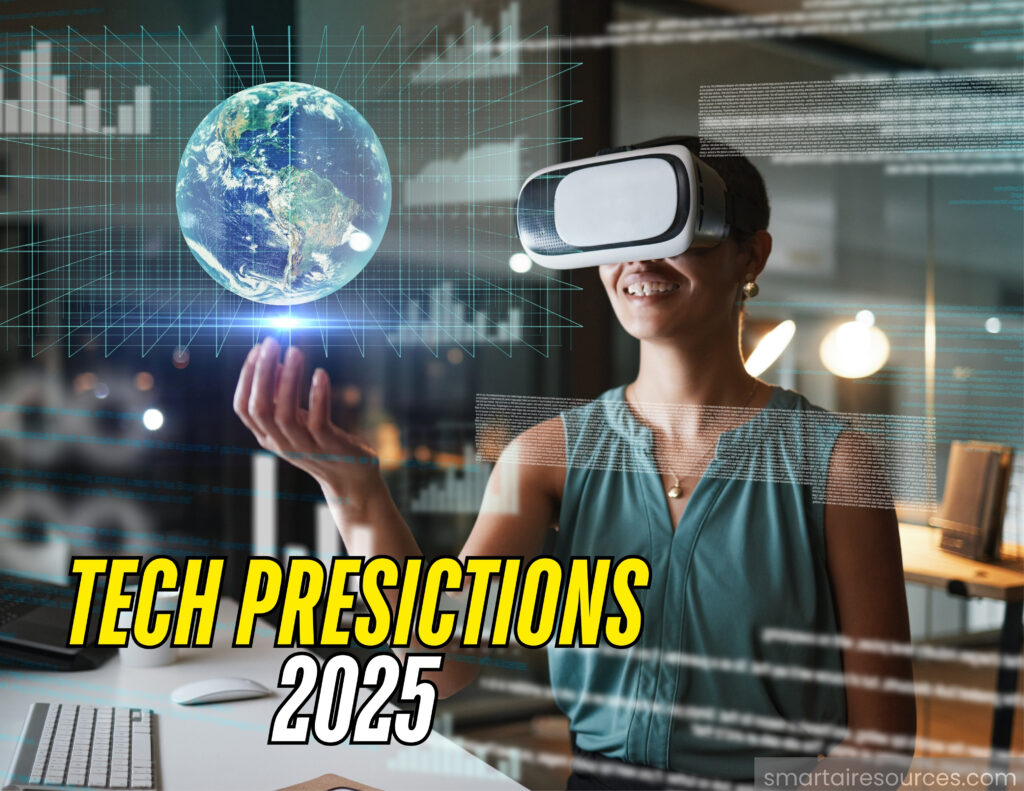
Hey there, future explorers! Ready to take a journey into the tech world of 2025 and beyond? The future is unfolding right before our eyes, and there’s no better time to explore the transformative technologies that are shaping our world and redefining what’s possible. In the next few minutes, we’ll dive into some of the most exciting tech trends, from artificial intelligence to augmented reality, and from quantum computing to space exploration. Let’s jump right in.
The Rise of Artificial Intelligence (AI)
Artificial Intelligence is no longer just a buzzword or the stuff of science fiction. It’s already here, making waves across industries and transforming how we live, work, and play. AI is reshaping everything—from personalized shopping recommendations to life-saving medical breakthroughs—and it’s only going to get more integrated into our daily lives as we move into 2025 and beyond.
Imagine your day already optimized by your AI assistant when you get up in the morning. It orders groceries, plans meetings, forecasts traffic for your commute, and even reminds you of crucial chores. Doesn’t that sound like a scenario from a future film? However, this is already taking place in real life as smart assistants like Apple’s Siri, Amazon Alexa, and Google Assistant become more commonplace in our daily lives. They simplify and streamline our lives so we can concentrate on the important things.
AI is transforming entire businesses; it’s not simply a handy tool. AI-powered diagnostics in healthcare are helping physicians identify illnesses early on, which improves patient outcomes. Chatbots and virtual assistants powered by AI are revolutionizing customer service by enabling companies to offer round-the-clock assistance while cutting expenses. AI is becoming the foundation of contemporary technological advancement, whether it is used to analyze vast volumes of data, automate difficult activities, or propel advancements in robotics.
As AI continues to evolve, it will start anticipating our needs before we even voice them. Imagine AI learning from our daily habits, preferences, and routines, making every interaction smoother, faster, and more personalized. But as we move toward this AI-driven future, it’s important to consider the ethical implications. Will AI have the potential to make decisions that affect human lives? How do we ensure AI remains transparent and accountable?
As the AI ecosystem expands, we must embrace the potential of these advancements while also keeping a close eye on their societal impact. The possibilities are endless, and 2025 is just the beginning.
Virtual Reality (VR) and Augmented Reality (AR)
Let’s talk about virtual reality (VR) and augmented reality (AR)—two technologies that are poised to revolutionize how we interact with the world around us. From entertainment to education, from healthcare to retail, VR and AR are not just gimmicks but tools that will change the way we experience life.
Virtual Reality is all about immersion. It’s about stepping into entirely new worlds and experiencing things as though they are real, even if they’re entirely computer-generated. Imagine watching a history documentary, but instead of just watching it on a screen, you step into the ancient city, walk its streets, and interact with the environment. That’s VR in action.
Beyond entertainment, VR is making a significant impact in fields like remote work, gaming, therapy, and even education. For instance, VR is helping people with anxiety and PTSD by immersing them in controlled environments where they can safely confront their fears. It’s also transforming education by offering students a chance to experience hands-on learning in virtual environments—be it a chemistry lab or a historical event—without leaving their homes.
On the other hand, Augmented Reality (AR) is all about layering digital information onto the real world. Instead of replacing the real world with a virtual one, AR enhances the world we live in with interactive elements. Imagine trying on clothes virtually, using AR to see how they look in your space before you make a purchase. Or picture using AR in real estate, where you can walk through a property, look at details about the furniture or layout, and get a sense of the space without physically being there.
AR is changing industries like retail, real estate, education, and tourism, giving users interactive and immersive experiences that make shopping, learning, and exploring more engaging than ever before.
VR and AR technology will be used even more extensively in 2025. For example, mixed reality (MR), which integrates both AR and VR, will become increasingly common, allowing users to easily navigate between the real world and virtual surroundings. Global education will become more accessible thanks to VR-powered virtual classrooms that enable students to attend classes from a distance. Additionally, AR will assist surgeons in the medical field by giving them access to real-time data and 3D visualizations during procedures, increasing accuracy and lowering risks.
The Internet of Things (IoT): The Magic of Connected Devices
Imagine a world where everything around you is connected, from your coffee maker to your car, your thermostat to your refrigerator. This is the promise of the Internet of Things (IoT), a network of devices that communicate with each other to optimize your life in ways you never imagined possible.
In the near future, IoT will be a key driver of the smart home revolution. Your coffee maker will start brewing your morning cup as soon as your alarm goes off. Your refrigerator will notify you when you’re running low on groceries and even suggest recipes based on what’s inside. Your car will send maintenance reminders, and your thermostat will automatically adjust the temperature based on your daily schedule.
Beyond the home, IoT will revolutionize industries like agriculture, healthcare, and energy. In agriculture, IoT sensors will monitor crop health, water usage, and soil conditions, enabling farmers to make data-driven decisions that increase yield and reduce waste. In healthcare, IoT devices like wearable fitness trackers and smart medical implants will monitor patients’ health in real time, allowing for faster diagnoses and personalized treatments. Cities will use IoT to optimize traffic flow, monitor air quality, and improve energy efficiency.
The ultimate goal of IoT is to create a seamless, interconnected world where devices talk to each other and optimize our environment without us having to lift a finger. By 2025, the IoT ecosystem will expand to include billions of devices, making life more efficient, reducing waste, and improving sustainability.
The Changing Workplace: Automation and the Gig Economy
The workplace is changing faster than ever, thanks to technological advancements in automation, AI, and remote collaboration tools. With automation taking over repetitive and mundane tasks, employees will be freed up to focus on more strategic and creative endeavors. This shift will create exciting new opportunities in fields like data science, cybersecurity, and AI development.
As automation evolves, the demand for workers with skills in emerging technologies will rise. Fields like AI, cybersecurity, cloud computing, and blockchain will see a significant increase in job opportunities. As a result, continuous learning will be essential for workers who want to stay ahead in the game. In fact, the most successful workers in the next decade will be those who can adapt quickly to changing technologies and learn new skills on the fly.
Another major trend will be the continued rise of the gig economy. Remote work is already booming, and as more companies embrace flexible work models, the gig economy will expand even further. People will have the opportunity to work on their terms, choosing projects that match their skills and interests while maintaining a better work-life balance.
In 2025, we’ll likely see a more decentralized, flexible workforce that’s empowered by technology. AI-driven hiring platforms, automation in HR processes, and remote collaboration tools will make it easier for companies to find talent from around the world, while also offering workers the freedom to work from anywhere.
Quantum Computing: Unlocking the Power of the Future
Now, let’s talk about one of the most exciting and revolutionary technologies on the horizon: quantum computing. Unlike traditional computers, which process information in binary (using ones and zeros), quantum computers use quantum bits, or qubits, which can exist in multiple states at once. This allows quantum computers to perform calculations that would take classical computers thousands or even millions of years in a fraction of a second.
Quantum computing has the potential to revolutionize fields like cryptography, drug discovery, and artificial intelligence. For instance, quantum computers could break current encryption methods, prompting the need for more secure forms of digital communication. In the realm of drug discovery, quantum computing could simulate molecular structures, speeding up the development of new medicines and vaccines.
Even though quantum computing is still in its early stages, big IT firms like Microsoft, IBM, and Google are already making great progress in this area. We anticipate more advances in quantum computing by 2025, with real-world uses beginning to appear in sectors including cybersecurity, banking, and healthcare.
The Future of Space Exploration
Finally, let’s talk about the final frontier—space exploration. In 2025 and beyond, space travel will continue to make incredible leaps. Private companies like SpaceX are already working on sending humans to the Moon, Mars, and beyond. With plans for lunar bases and potential Mars missions, the dream of interplanetary travel is becoming a reality.
Space exploration will not only expand humanity’s horizons but also drive advancements in technologies like sustainable energy, robotics, and materials science. For instance, the need for long-term space missions will spur the development of life support systems, renewable energy sources, and autonomous robots that can assist astronauts.
Additionally, space exploration will provide a new economic frontier, opening up opportunities for mining asteroids, colonizing other planets, and creating a new space economy.
Conclusion: Embracing the Future
As we move into 2025 and beyond, we’re on the brink of an exciting new era driven by AI, AR, quantum computing, and many other groundbreaking technologies. These innovations will transform industries, reshape our daily lives, and open up new possibilities that we never thought possible.
Whether it’s improving healthcare, enhancing education, optimizing our homes, or exploring the stars, the future is brimming with endless potential. The key to navigating this future is curiosity, adaptability, and continuous learning. Stay curious, embrace new technologies, and be prepared to witness the incredible advancements that await us in the coming years.
So, what are you most excited about? Share your thoughts and predictions for the future in the comments below, and don’t forget to subscribe for more content on the latest tech trends. The journey into the future has just begun!
